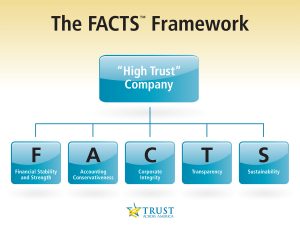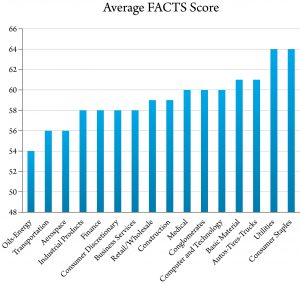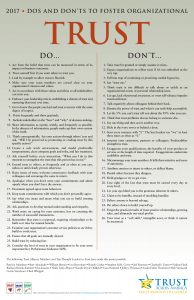Far away and just as long ago, in the land of gardens and strip malls, also known as New Jersey, a somewhat smallish “Jersey Girl” named Barbara (Barb to her high school friends) had a rather tall vision to change the world, or at least the conversation. Barb believed that if she could get people thinking about trust, particularly in business, trust would spring eternal- similar to Jersey blueberries- and take off like a Jersey driver.
And so Barb began to knock softly on the doors of corporate America to politely inquire about trustworthy leaders and their business practices. The responses were far from what she expected to hear.
- We are big business and don’t budget for soft stuff like trust since it doesn’t impact our bottom line.
- The corporate credo written on the lobby wall has trust covered.
- We are already trustworthy. After all, our quarterly earnings are growing and look how fast we are expanding globally.
- We give to charities and have an annual CSR event.
- Haven’t you seen our latest TV commercial on diversity?
- We’re conserving water and energy.
- We are looking in to cybersecurity.
- Our compliance department “has trust covered.” We stay just on the “right side” of the law.
- Who cares if our employees are unhappy? There are plenty to replace them.
- And the best one, the response from the CEO of a Fortune 500 company… “Trust? Interesting, I never even thought about that word!”
Barb’s quick takeaway…the trust crisis is not the “problem” of big business (until there’s an internal crisis and then lots of money is paid to consultants to make it look like the problem is fixed when it’s not), and one person named Barb from NJ is no threat to big business! Go knock somewhere else until such time as trust is regulated.
And that’s exactly what she did, because Barb had changed her middle name from Jane to “Tenacity” right around her fifth annual 39th birthday. She knocked and knocked and did not give up until the right people started to listen, and even lend a hand. And then the idea struck (sort of like a lightening bolt) – if one rather small woman from NJ could get some “trust loving”, imagine how much 100 men and women, or 1000, or even a million could attract? And so she started a movement, A Campaign for Trust, and she invited everyone who didn’t slam the door to join her (except the mainstream media because they seemed perpetually stuck on bad news that sells)!
In a few months, eyebrows began to raise beyond Jersey’s borders, as did the roster of global Trust Alliance members, men and women from “big business” (the ones who didn’t slam the trust door), small business, startups academia, researchers, community leaders, government and consulting (leadership, culture, teamwork, compliance, ethics, CSR, HR, sales, reputation and crisis repair, communications, risk, data security, governance, sustainability.) They weren’t exactly sure what “signing up” meant, but they trusted Barb enough to know they wanted to be part of this particular movement, because without trust, organizations are at best mediocre, never knowing when the next crisis will strike.
The Trust Alliance has been quite busy over the past four+ years with dozens of projects including:
- Roundtable discussions with industry leaders on building trust
- Publication of three books in our Trust Inc. series
- Introductions between members resulting in speaking engagements, consulting opportunities and new business relationships
- An annual trust poster
- Publication of a collaborative digital magazine called TRUST!
- Assembly of DIY Trust Boxes
- Real world case studies called Trustlets
And many more initiatives including two new programs launching this fall. After all, it’s hard to imagine why any organization (even one run by a small, perpetually 39 year old woman from NJ) wouldn’t want to join us and collaboratively help in elevating organizational trust. So what’s holding you back? Feel free to use one of the excuses listed above!
(And by the way, on most days Trust Across America’s website attracts between 500-1000 enlightened visitors who “get” the importance of organizational trust.)
PS- One of Barb’s offspring cautions about trying to be funny about trust. It’s a serious subject. Barb disagrees. She thinks trust can be funny and fun, and serious too! What do you think?
Barbara Brooks Kimmel is the CEO and Cofounder of Trust Across America-Trust Around the World whose mission is to help organizations build trust. She also runs the world’s largest global Trust Alliance and is the editor of the award- winning TRUST INC. book series. In 2017 she was named a Fellow of the Governance & Accountability Institute, and in 2012 she was recognized as one of “25 Women who are Changing the World” by Good Business International. She holds a BA in International Affairs from Lafayette College and an MBA from Baruch at the City University of NY.
For more information visit our website at www.trustacrossamerica.com or contact Barbara Brooks Kimmel, CEO and Cofounder
Barbara@trustacrossamerica.com
Copyright 2017, Next Decade, Inc.







Recent Comments